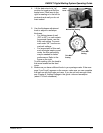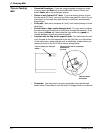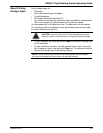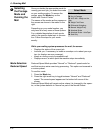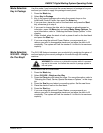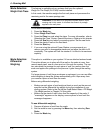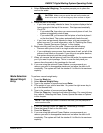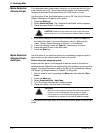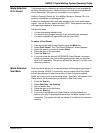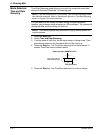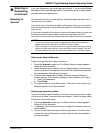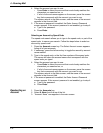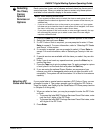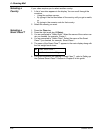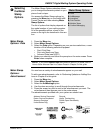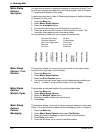
DM925™ Digital Mailing System Operating Guide
SV62207 Rev. B 4-15
Mode Selection:
Print Permit
This feature may be offered as an optional feature and is not available on
all Pitney Bowes solutions. Please contact your local account representa-
tive to determine if this option is accessible on your system.
Refer to Ord
ering Permits for Your Mailing System in Chapter 12 in this
guide for information on ordering permits.
A permit is a special postal mark used instead of the usual meter stamp
imprint.
You can file for a permit with the USPS. These permits provide you
with special processing or discount rates.
Use permits when:
• You are processing standard mail.
• You want to apply prepaid postage to an enclosed reply envelope.
• You have a special rate agreement with the post office.
To select a Print Permit:
1. From the IntelliLink® Control Center, press the Mode key
.
2. Select Print Permit.
The “Print Permit Selection” screen appears.
3. Select the permit you want and press En
ter.
4. Place the mail on the feed deck.
5. Press the St
art key.
6. If you are using the optional DJPS/DMPS Power S
tacker, we recom-
mend you remove your mail in manageable stacks and not allow the
deck t
o fill completely. The system will halt the stacker if it is filled to its
maximum capacity.
Mode Selection:
Seal Menu
Seal Only Mode allows you to seal envelopes without applying postage. If
you are running INVIEW™ Accounting, and you select Seal Only Mode,
you will be prompted to select an account to track the pieces against.
When you view or print an accounting report, “Seal Only” will appear in the
Class colu
mn if the pieces were processed in Seal Only mode.
1. Press the Seal key
.
2. Select Sea
l Only - No Printing.
3. Set the sealer lever.
4. Place the mail on the feed deck.
5. Press the St
art key.
6. If you are using the optional Power S
tacker, we recommend you
remove your mail in manageable stacks and not allow the deck to fill
completely. The system will halt the stacker if it is filled to its maximum
capacity.



